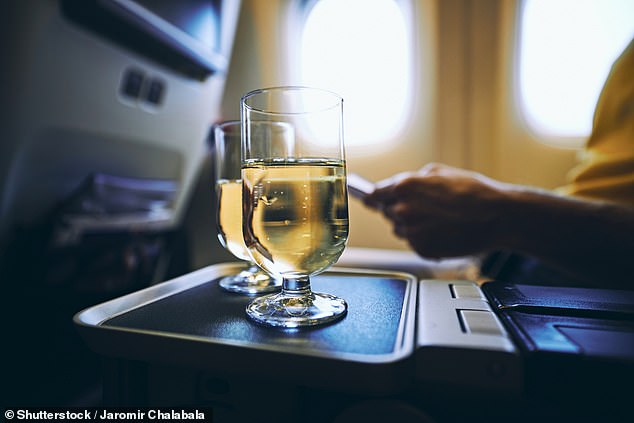There’s nothing that gets you in the holiday mood quite like that first glass of wine or pint of beer at the airport.
But travellers, beware – as the combination of alcohol plus cabin pressure may threaten sleeping plane passengers’ heart health, suggests the first study of its kind.
Researchers have discovered that the duo lowers the amount of oxygen in people’s blood (SpO2) and raises heart rate for a prolonged period of time, even in people who are young and healthy.
The higher the alcohol consumption, the greater these effects might be, particularly among older passengers and those with existing medical conditions, they warned.
And they suggested it may now be time to consider restricting on-board access to alcohol – particularly on long-haul flights.
A team from the Institute of Aerospace Medicine in Cologne, Germany, recruited 48 people for their study aged between 18 and 40.
Researchers have discovered that the duo lowers the amount of oxygen in people’s blood and raises heart rate, even in young and healthy people
Participants were split into two groups – half slept in a lab in normal air pressure conditions, while the rest slept in an altitude chamber that mimicked cabin pressure during an airplane’s cruising altitude.
In each group, half then slept for four hours having drunk no alcohol, while others slept for four hours having drunk the equivalent of two cans of beer or two glasses of wine in pure vodka.
For those who slept in normal pressure conditions, and had not consumed any alcohol, their blood oxygen levels remained steady at around 96 per cent with a sleeping heart rate of 64bpm.
However, analysis revealed those who had drunk alcohol and were in the altitude chamber recorded a fall in blood oxygen levels, to an average of 85 per cent.
Meanwhile their heart rates increased to an average of nearly 88bmp during sleep.
This compared to an average blood oxygen level of 88 per cent and a sleeping heart rate of 73bpm among those in the altitude chamber who had not drunk alcohol.
Writing in the journal Thorax, the researchers said: ‘Together these results indicate that, even in young and healthy individuals, the combination of alcohol intake with sleeping under hypobaric conditions (cabin pressure) poses a considerable strain on the cardiac system and might lead to exacerbation of symptoms in patients with cardiac or pulmonary diseases.’
These effects might be even greater in older people, they suggest, adding: ‘Cardiovascular symptoms have a prevalence of 7 per cent of inflight medical emergencies, with cardiac arrest causing 58 per cent of aircraft diversions.’
They concluded: ‘Practitioners, passengers and crew should be informed about the potential risks, and it may be beneficial to consider altering regulations to restrict the access to alcoholic beverages on board aeroplanes.’
The team said the study participants slept lying down – a luxury usually only afforded to those flying first class – so the findings may be different for the bulk of plane passengers who fly economy.
Source: Mail Online
